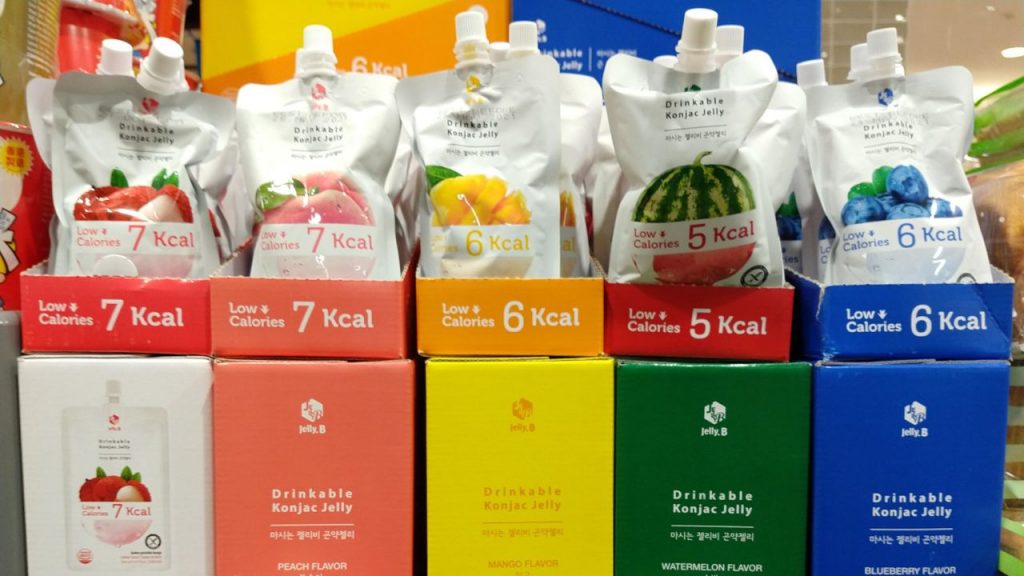Konjac Jelly’s weight loss secrets are the latest topic of curiosity on the internet. Reddit is filled with queries on their health benefits, calories, the best brands of Konjac Jelly that provide great results for weight loss, and where to buy them. The Konjac plant is said to be really good for you and your health. EVERYDAZE and Korean brands seem to be the some sought-after Konjac Jelly. Other queries include how to use Konjac Jelly for weight loss.
Meanwhile, products like flour, jelly, etc. can be made with the Konjac plant. People believe that konjac jelly, especially, helps in weight loss. They regard it as their secret for their transformation. However, some research centers deny it. Let’s find out the truth about the Konjac plant and Konjac jelly.
Konjac is a plant from which high-fiber dietary supplements, jellies, and flour are made. It is also used in Japanese and Chinese traditional medicine.
The corm of the konjac plant is a starchy root. This is high in glucomannan, a form of dietary fiber. This section of the plant is used as a dietary supplement as well as in the manufacturing of high-fiber flour and jellies.
Konjac jelly is prepared from the corm of the konjac plant, which acts as a gelatin substitute due to its fiber and starch content. Water and konjac powder are combined to make a gelatinous goo in konjac jelly products.
Flavoring and sugar alternatives are then added to create a gelatin-like snack that is high in fiber and low in calories. Low-in calories automatically help in weight loss. Let’s find out more secrets of Konjac jelly on weight loss.
Is Konjac Jelly Really the Secret to Weight Loss?
According to Hunnes, konjac may help promote healthy cholesterol levels similarly to how soluble fiber in oats might. Although only seven persons were studied, a study indicated that the fiber in konjac may help relieve constipation. What about konjac jelly, though?
People who want to reduce weight may benefit from glucomannan manufactured from konjac. A 2005 study discovered that taking a soluble dietary fiber supplement helped overweight people lose weight. The supplement was taken as part of a well-balanced, calorie-controlled diet by the participants.
However, a 2014 meta-analysis found no difference between glucomannan and placebo in terms of weight loss.
Abdominal discomfort, diarrhea, and constipation were also reported as side effects of the fiber supplement. By decreasing the rate at which the digestive tract empties, glucomannan may help a person feel full for longer.
The effects of a glucomannan supplement were compared to those of a guar gum supplement. They discovered that taking a glucomannan supplement boosted weight loss significantly, whereas taking a guar gum supplement did not.
However, despite the fact that the participants appeared to tolerate the supplement well, other studies indicated that konjac did not promote weight reduction or significantly modify body composition, affect sensations of hunger or fullness, or improve lipids or blood glucose readings.
Other health benefits of konjac are also thought to exist. Many of these advantages are due to the konjac plant’s high amount of glucomannan, a soluble dietary fiber found naturally in the plant.
Some of the diseases that it can help us with are Cholesterol, Wound healing, Diabetes management, Constipation, and Healthy skin.
What Are the Best Konjac Jelly Brands?
According to Hunnes, Konjac has some well-known dangers. Because konjac gel sweets don’t dissolve as easily as other gel candies or gelatin treats, they’ve been linked to choking deaths. It’s also possible that konjac will expand in the esophagus or bowel, causing medical complications.
Because of these concerns, the European Union and Australia have banned konjac jelly. However, Konjac corm is used in a variety of products, including Konjac flour, Konjac jelly, and Konjac soluble fiber.
First and foremost: Before determining whether or not to consume konjac jelly, Hunnes recommends reading any instructions and warnings. Keep in mind that, unlike flavored gelatin, konjac jelly does not melt in your tongue and may require chewing.
If you’re still interested in trying this trend, make sure to read the nutrition labels carefully. Despite the fact that the konjac plant is known for its high fiber content, many popular konjac jelly brands don’t actually contain much dietary fiber.
Konjac jelly has a chewy texture and is sweet, but there’s not much else to it, and many of them are high in artificial sugars and sugar alcohols.
Here are a handful of the more well-known brands, but you’re generally better off satisfying your snack needs with lower-calorie snacks that are higher in nutrients, such as fiber.
EVERYDAZE Konjac Jelly
This brand offers a variety of flavors, from peach to cola, as well as vitamin C and collagen supplements. While the label claims zero sugar, it contains erythritol (sugar alcohol) and sucralose (a sugar substitute), therefore it isn’t Sugar-Free 3-approved.
Jayone Drinkable Konjac Jelly
These six-calorie jelly pouches come in three flavors: grape, mango, and peach. They’re sweetened with 12 grams of erythritol and have no fiber.
Jelly B Drinkable Konjac Jelly
These on-the-go packets have 5 to 7 calories per flavor and are available in apple, watermelon, and blueberry flavors. They do, however, contain 12 grams of erythritol and don’t provide much dietary fiber.
Visit House & Whips for more interesting stories of your favorite celebs.







